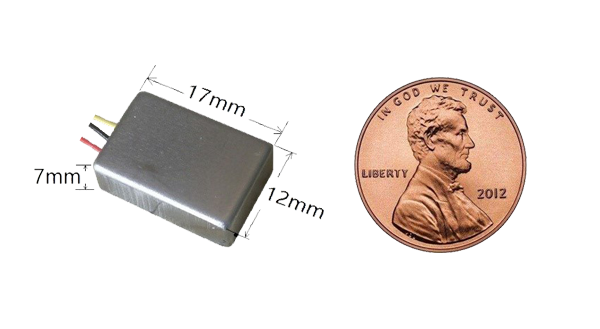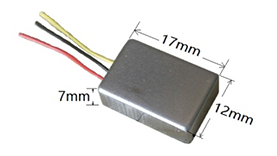This mini-Gamma sensor uses a 4x4x8mm Cesium Iodine (CsI) scintillator that is a radiation-sensitive crystal as the detection component. It works with a PIN diode to convert the radiation to electric outputs. Along with a high sensitive preamplifier, the CsI crystal and PIN diode are encapsulated into a 17x12x7mm metal enclosure. This compact mechanical design enables the sensor to be used in small digital devices such as smart phones, smart watches and other wearable devices used for those who are sensitive to radiation.
This mini-Gamma sensor can be used to detect X-ray and Gamma ray with the energy from 30keV to 3MeV. The output of the sensor is half-gauss shaped pulse signal. The amplitude of output pulse is relevant to the energy of incident radiation particle. Below 1.2MkeV of incident particle energy, the amplitude of output pulse is proportional to the energy of radiation particle. In addition the counting rate of output pulse is proportional to the radiation intensity of the measuring field as well.
A voltage with a range from 2.0V to 5.5V can be used to power this mini-Gamma sensor. However, the applied voltage should come from stable DC power that has no ripple ideally or as minimized as possible because the DC power ripple couples with input terminal of the high sensitive preamplifier to form fault signals.
| Measureable range of X/γ energy | 30keV to 3MeV |
| Sensitivity | > 4000 pulse counts per 1uSv |
| Energy linearity | 1mV / keV (E < 1.2MeV) |
| Upper limit of measurable dose rate | 50mSv / h |
| Operating voltage | Operating voltage |
| Static current | < 200μA @ 3.3V |
| Working temperature | -20℃ to 50℃ |
| Dimension | 17 x 12 x 7mm |
| Weight | appropriate 1.5g |
| Static offset level of output | 850mV ± 150mV |
| Wires | 1-Red: Power V+; 2-Black: V- or Ground; 3-Yellow: Signal output |


